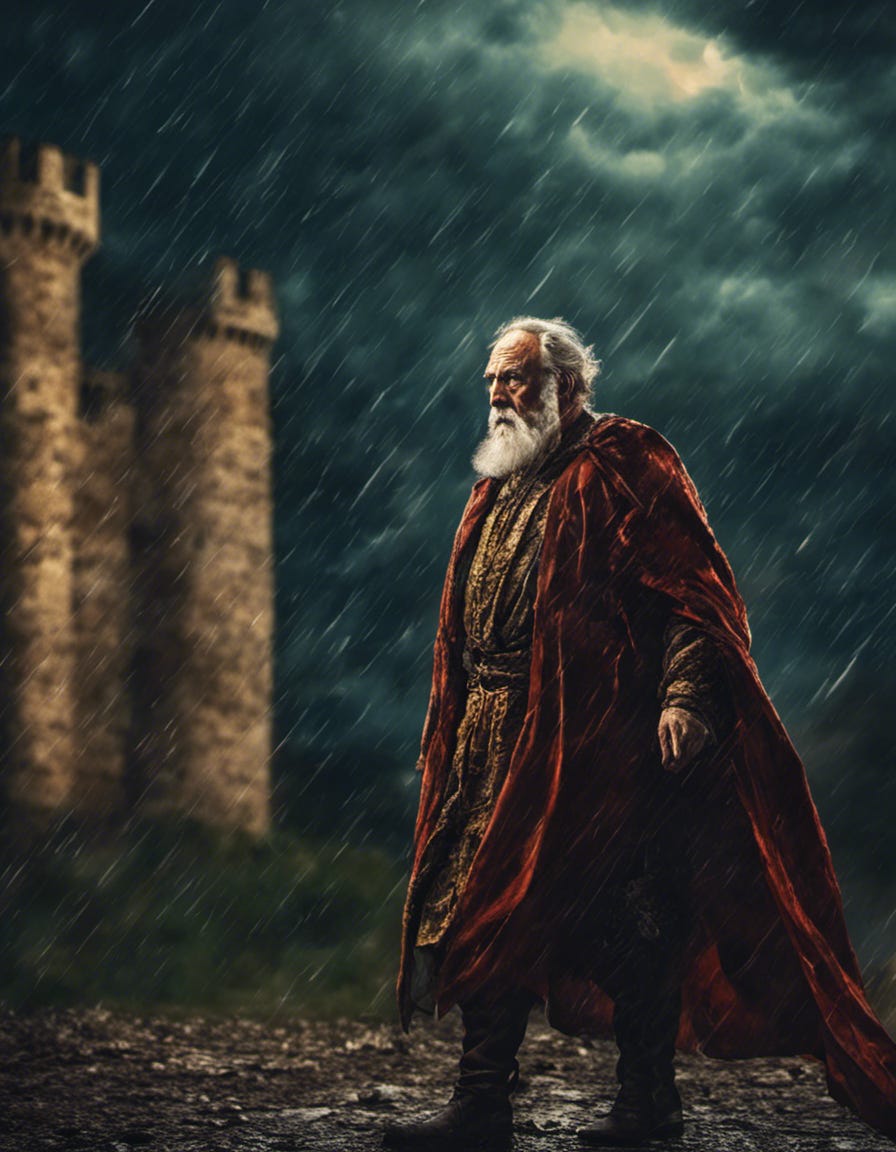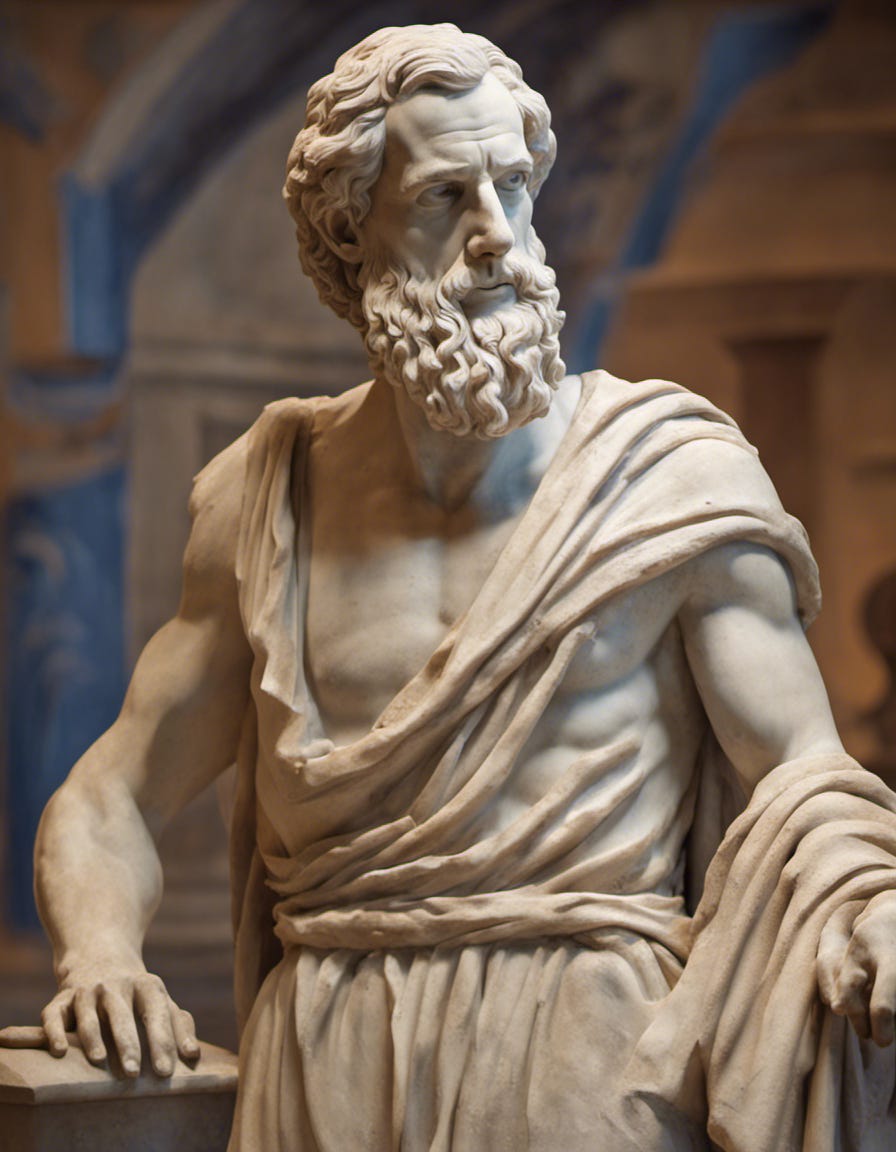Young, Wise, and Bold: Shakespeare's Timeless Insights
Is it conceivable for one to embody youth, wisdom, and boldness concurrently? Shakespeare might have some answers.
Can one be all three simultaneously?

Does one need to be old to be wise?
King Lear and the Fool
Only the other day, I came across the following quote from Shakespeare’s “King Lear”, where his Fool addresses the ageing Monarch:
“Thou should’st not have been old till thou had’st been wise.”
This line from Shakespeare's "King Lear" is one of the many poignant observations made by the Fool, a character who often uses wit and humour to present truths and challenge the thinking of those around him, especially King Lear himself.
The quote "Thou should’st not have been old till thou had’st been wise" from the famous Shakespearean tragedy encapsulates the expectation that age should bring wisdom. King Lear's decision to divide his kingdom among his daughters based on their professed love reveals a lack of wisdom, an irony highlighted by the Fool. This choice, driven by vanity rather than judicious reasoning, precipitates his tragic downfall.
Portia, the wealthy heiress in “Merchant of Venice”
It immediately took me back to my High School days, in Yadavindra Public School, Patiala, where we’d read the Bard’s “Merchant of Venice” with much relish. In particular, I was reminded of the scroll in the Golden Casket, which had been chosen by a vain and arrogant suitor of Portia who, however, failed to win the hand of the fair lady. It read:
“Had you been as wise as bold,
Young in limbs, in judgment old,
Your answer had not been inscrolled.”
In the “Merchant of Venice," Portia's suitors face a pivotal test: choosing the correct casket—gold, silver, or lead—to win her hand in marriage. The golden casket, chosen by the audacious Prince of Morocco, bears the inscription, "Who chooseth me shall gain what many men desire." But upon opening, instead of Portia's portrait, it reveals a skull and a cautionary message. This twist underscores Shakespeare's recurrent theme that true value is internal and cautions against decisions based on mere appearances or external allure. The scroll suggests that discernment in judgment surpasses eager pursuit, reminding suitors to look beyond the superficial.

Essence of the two quotes
Both the excerpt from "The Merchant of Venice" and the quote from "King Lear" highlight Shakespeare's exploration of true wisdom versus superficiality. These instances shed light on the value of profound understanding over mere appearances and impulsive decisions.
These reflections led me to a deeper realization. Shakespeare masterfully weaves three distinct themes across these two plays: Age (or Youth), Wisdom, and Boldness.
In "King Lear," the Fool subtly chides the monarch for behaving foolishly despite his age, suggesting that age should be accompanied by wisdom. Conversely, the message in "The Merchant of Venice" suggests that, irrespective of age, a man can possess both wisdom and audacity; young men are not excluded from having mature discernment.
Can one be simultaneously wise, bold and youthful?
This thought intrigued me. Is it possible for someone to embody the vibrancy of youth, the depth of wisdom, and the audacity of boldness all at once? Such a blend would undoubtedly be formidable. However, does nature impose innate limitations, suggesting inherent trade-offs in these qualities? While intelligence might be innate, wisdom often seems to emerge with age and lived experiences. Contrastingly, boldness, when unchecked, might manifest as recklessness or impulsiveness, attributes often seen as opposing wisdom. Pondering these relationships led me to formulate a hypothesis, represented as a linear equation.
W+Y+B= Constant k
Where, W=wisdom; Y is a measure of youth and is equal to (120 years- current age in years); B is the boldness quotient. “k” is constant for every individual but may vary from person to person.
A word about Y. Y is not age; rather it is 120 years minus one’s current age in years. 120 years had been chosen since as per the ancient Indian Astrology and Vedic Sciences, man’s ideal life-span is 120 years. Thus, any horoscope prepared by the ancient Hindu system presents planetary constellations spanning for exactly 120 years from birth. Y is the measure of your “youth” or “youthfulness” in the chronological sense. Accordingly, a new born child has a maximum youthfulness of 120, whereas the same reduces linearly as she grows in age.
Built-in constraints of nature
In this equation, Y is a most deterministic entity. Moreover, you have no control over it. At a given point in your life, it is fixed; it is simply a measure of your youth at that time. Thus (Y) then being fixed, at a given juncture of one’s life, the sum of wisdom (W) and boldness (B) must be constant. In other words, the wiser you are, the less bold you are likely to be. Conversely, a bolder person, even a reckless person, may be regarded as less wise. This seems to be intuitively correct, too. It may, however, be instructive to point out at this stage that no causality of direction is being indicated or implied here. All that we are suggesting is that there is an inverse relationship, rather co-relationship, betwixt the two. In other words, you could say since a person is extraordinarily bold, he is likely to be less wise.
As we age
From our basic equation, it's evident that as we age and Y diminishes, the collective value of our wisdom and boldness escalates. As we journey through life, we face a choice: to either cultivate greater wisdom or amplify our boldness, but balancing both becomes challenging. An increase in wisdom often aligns with cautious, risk-averse decisions, suggesting a decrease in boldness. On the other hand, escalating boldness, possibly to the point of recklessness as seen in King Lear, can overshadow and diminish our wisdom, potentially leading others to perceive us as irrational or even insane.
Testing our hypothesis
Let's examine our equation in light of age's influence. When assessing a newborn, the combined value of W (wisdom) and B (boldness) is essentially at its minimum. This is because, with Y equating to 120 (the theoretical maximum), their cognitive and physical capacities are nearly non-existent at birth. However, a word of caution: our equation likely yields the most accurate results for individuals aged eighteen and above. There are exceptions, of course, such as child prodigies or teenage geniuses with remarkable abilities. Furthermore, it's worth reiterating that while ‘k’ remains theoretically consistent throughout an individual's life, its actual value can differ substantially from one person to another.
There are trade-offs — one cannot have everything
Ultimately, throughout life, an individual must strike a balance between wisdom and boldness, akin to juggling risk and discretion. While greater boldness might promise significant rewards, it simultaneously exposes one to potential losses and setbacks. On the other hand, opting for heightened wisdom typically directs us towards a more cautious or conservative route, which, while safer, often results in more modest gains.
Is Intelligence (IQ) useful?
So, what does this constant, k, represent? We posit that "k" corresponds to one's IQ, or Intelligence Quotient. For instance, an individual with an IQ of 160 possesses a 40-point advantage in comparison to someone with an IQ of 120. This could suggest that a person of higher intelligence might demonstrate a “mature head on young shoulders”. This higher IQ also provides additional leeway (40 points in our hypothetical case) to bolster either their wisdom or boldness based on their assessment of particular life situations. Some might contend that solely using IQ oversimplifies the equation, suggesting that factors such as Emotional Intelligence, luck, opportunities, familial background, and individual financial standing should also be taken into account. While there's a valid argument for this broader perspective, our intention was to present a more streamlined analysis, thus steering clear of these complexities.
The individual must optimize
In conclusion, the heart of our exploration suggests that for every individual, at any given moment in their life, there exists a defined sum of wisdom and boldness available to them. The quintessential challenge, then, is not merely possessing these attributes but effectively optimizing their application in actions or decisions. It’s worth noting that individuals with higher IQs seemingly have a larger pool of this collective wisdom and boldness to draw from. This intricate balance between intellect and daring often determines the trajectory of one’s life, requiring both introspection and audacity in equal measure.
Feedback is welcome
I would love you hear from you, especially those who do not agree with me. Comments in the Substack app/ website will also give the others the benefit of your insights.









Mr. Sidhu: you impart knowledge so eloquently.
Today , we witness first hand in our own environment that age and wisdom does not have linear relationship. I compare my age with my son and his wisdom and boldness- the difference is light years.
Agree100% that innate intelligence can be substituted with wisdom gained from study of environment around you . You used the term experience , instead I always use the term observation ( in reality sum of observations = experience) . Blue collar workers like me who lack innate intelligence compensate by observations .
Enjoyed it , drank every verse to the last drop.
Best regards